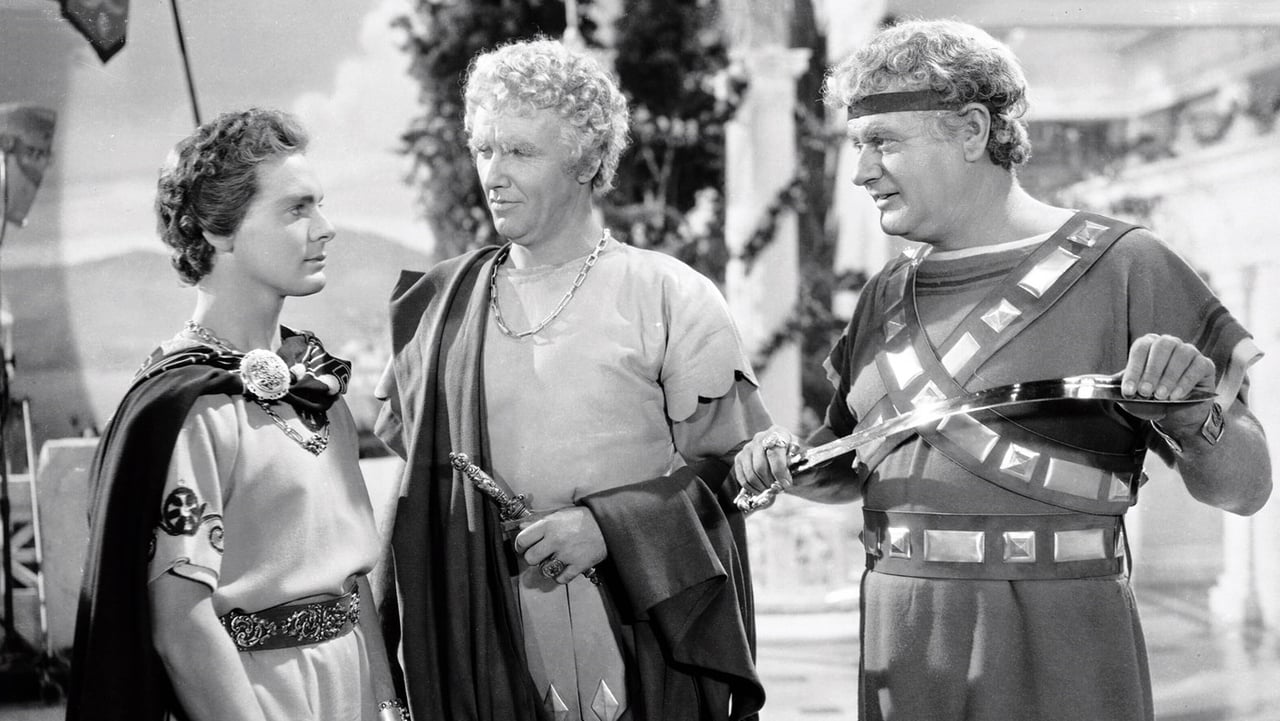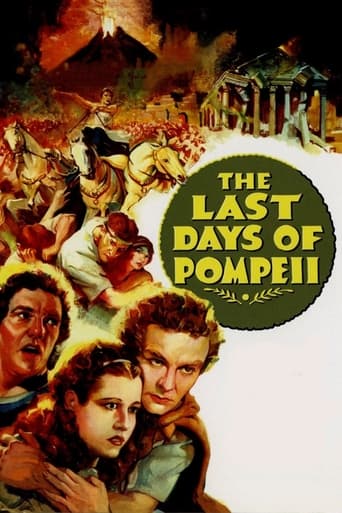



Strong and Moving!
Self-important, over-dramatic, uninspired.
recommended
just watch it!
The spectacular ending of the 1935 version of "The Last Days of Pompeii" is an early example of Hollywood's fixation with the concept of disaster movies. The plot involves a blacksmith in Pompeii named Marcus (a very believable Preston Foster) who is forced to enter the gladiator ring after his wife and child die from injuries sustained in a tragic accident. Because he lacked the fiscal means to give them proper care, Marcus soon decides that money is everything and becomes the star of the arena. He adopts a small boy who's father he killed and retires from his brutal profession after suffering a severe wound. He ends up in Judea with his kid and, in short succession, meets Jesus (who miraculously cures his son from a sudden illness), has an interview with Pontius Pilate (an excellent and pensive Basil Rathbone), bumps into Alan Hale (a professional horse thief), and even later watches Jesus being crucified. That would be enough for any one man, but Marcus' career is just beginning. He relocates himself back to Pompeii and, with his newfound wealth from rounding up stray horses, is able to become the head honcho at the local coliseum. Years pass, and his son is still fixated on that nice guy who cured him back in the old days. He meets up with some Christians who are hiding from the authorities and falls in love with the best looking gal in the bunch. There he finds out the truth about that "nice guy" and decides to throw his lot in with these wonderful folks. It doesn't take long before he and his friends are captured by the Romans and condemned to death as they are summarily tossed into the arena to be butchered by barbarian captives. Seeing his son about to be slaughtered, Marcus pleads for his release with the local Prefect (a cold and patrician Louis Calhern) but it's all for naught. Just as this desperate battle begins....Mt. Vesuvius blows its stack and the movie really picks up steam, in more ways than one. In the end, Marcus has a change of heart and decides to help the Christians at the expense of his fortune. He's able to get them on a boat to escape the catastrophic effects of the volcano and locks the city gates to prevent the Romans from stopping them. For this, he gets a well-aimed spear through the chest. Then the lava, the ash and the smoke envelop everything and everyone is presumed dead. Luckily for Marcus, he still has five seconds of life left in him and is visited by that "nice guy" Jesus who hands him a first-class ticket to Heaven. Let's face it, no one deserved it more for all the problems this poor guy went through. Of course, this would all be a bit overdone and corny if it weren't for the outstanding performances of the cast and the spectacular special effects during the destruction of Pompeii. Special note has to be made for Basil Rathbone's portrayal of Pontius Pilate. Although he's on the screen for less than ten minutes, he's able to convey the man's ambiguity and guilt-ridden conscience for having sentenced Jesus to death. His gravitas sets the tone for the entire film and it hangs over it like a shroud. As an early example of a Hollywood disaster movie, "The Last Days of Pompeii" is in a class by itself and still worth viewing for modern-day audiences.
View MoreThe team that produced King Kong for RKO Pictures, writer Meriam C. Cooper and director Ernest B. Schoedsack, decided to emulate Cecil B. DeMille in giving us The Last Days Of Pompeii. It's not a bad film, but it nearly bankrupted RKO so prohibitive was the cost for that small studio. The film bears a distinct resemblance to DeMille's eye filling, but now incredibly campy The Sign Of The Cross. Our protagonist here is Preston Foster who plays Marcus the Blacksmith, but before the film is done goes through more reinventions of character than you would find in good and bad Russian literature. As a content, but happy blacksmith a bit of good fortune has him and wife celebrating. But she's accidentally injured and dies for lack of medical care, not that medical care was all that good back in those days to begin with. Foster decides that all that matters in life is the money you can accumulate for a rainy day. Foster is constantly reassessing life throughout the film.Foster gets to go to Judea and is on the scene of the crucifixion and before that has Jesus heal his adopted son David Holt who grows up to be John Wood. Foster also meets Basil Rathbone as Pontius Pilate who also does some major reassessing after presiding over the trial of Jesus.If the Oscar for Special Effects was in existence in 1935 it would have been interesting to see either The Last Days Of Pompeii or Mutiny On The Bounty would have won the award. Those scenes of the volcanic eruption of Versuvius are what guaranteed this film would not show a profit. They do rival what DeMille was capable of, but DeMille had a far bigger studio and more financial security in Paramount.Also in the cast are Louis Calhern as the Roman consul and Alan Hale as Foster's number two man. They give their usual good performances.As for RKO Studios and Preston Foster, they got some Oscar recognition for another film that Foster did for them that year. It was the low budget, but incredibly powerful Irish story, The Informer where Victor McLaglen won for Best Actor. A much better film than The Last Days Of Pompeii. Still the spectacle of this film can still awe you, even on the small screen.
View MoreAlthough never entirely flawless, THE LAST DAYS OF POMPEII ('35) was an ambitious undertaking for RKO to take at that time. The storyline, about a bitter blacksmith who turns gladiator, is really a morality tale wrapped up in biblical settings and given the usual "cast of thousands" publicity by the studio that spent a lot of money in recreating Ancient times.PRESTON FOSTER was never a particularly charismatic actor, often accused of being "wooden", but there's a sincere element about his performance here that allows the film to work. So too does BASIL RATHBONE, giving some extra dimension to his take on Pontius Pilate.Interesting to catch a glimpse of WARD BOND as a gladiator--an actor who has appeared in so many classic films it's almost amazing to realize he was kept as busy as he was.With Max Steiner supplying the score, it's a lesser known gem that makes for enjoyable viewing even if it comes off as a cross between BEN-HUR and THE ROBE and lots of other stories dealing with the effect of the crucifixion on men's lives and their search for the truth.
View MoreConscious stricken after abandoning Christ on the way to Golgotha, a jaded slave trader witnesses THE LAST DAYS OF POMPEII, and the city's horrific destruction.Although burdened with occasional wooden acting, this is generally a fine historical drama. RKO spent quite a bit of money on its production and it shows in the large crowd scenes and still noteworthy special effects. The film boasted a very fine team behind the camera, working together as they had on KING KONG (1933). Directorial duties were shared by Ernest B. Schoedsack & Meriam C. Cooper. Special effects wizard Willis O'Brien worked his magic, while composer Max Steiner contributed a pounding score.Preston Foster had one of his finest roles as the stalwart blacksmith turned gladiator and slaver. His performance during the prolonged climax, while desperately trying to save the life of his doomed son, is especially effective. David Holt & John Wood, playing the youth at different ages, are also very good.Additional fine support is offered by Alan Hale as the rough mercenary who teams with Foster; and by villainous Louis Calhern as Pompeii's last prefect. Acting honors, however, go to marvelous Basil Rathbone, who gives a most sophisticated performance as Pontius Pilate, by turns rogue, fate's victim & moral philosopher.Movie mavens should recognize Ward Bond as a boastful gladiator, elderly Zeffie Tilbury as a soothsayer, Edward Van Sloan as Pilate's clerk & Edwin Maxwell as a Pompeii official, all uncredited.******************************The film makes rather a mishmash of historical chronology. Young Flavius appears to be about ten years old at the time of Christ's crucifixion, which occurred around AD 29. It would be another fifty years - August 24, AD 79, to be precise - until Vesuvius' eruption destroyed Pompeii, yet Flavius is still depicted as a youthful fellow, just reaching maturity. Early Christian tradition also holds that Pilate committed suicide in AD 39 - four decades before Pompeii's rendezvous with destiny.While using the same title & location, this film tells quite a different story from that of the classic 1834 novel by Baron Bulwer-Lytton.
View More